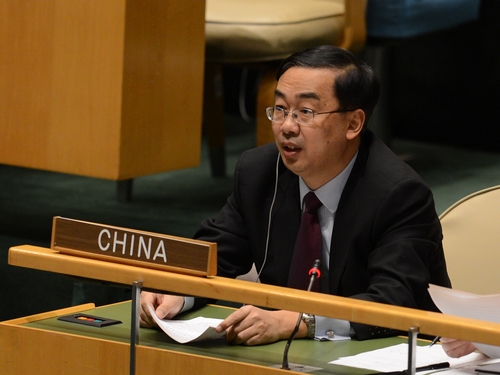| Statement by Ambassador Wang Min at the First Meeting of the Sustainable Development Goals Open Working Group |
| 2013-03-14 04:44 |
|
Photo by Niu Xiaolei/Xinhua News Agency
Mr. Chair, It gives me great pleasure to attend the first meeting of the Sustainable Development Goals Open Working Group and speak on behalf of China, Indonesia and Kazakhstan. We support the statement made by our Fijian colleague on behalf of the Group 77 and China. Let me begin by expressing our gratitude to the permanent representatives of Brazil, Kenya and Hungary for their great effort that has made the smooth convocation of this meeting possible. I wish to congratulate the permanent representatives of Kenya and Hungary on their election as the co-chairs of the Open Working Group. The United Nations Conference on Sustainable Development, or the Rio+20, was successfully held last June, sending a positive, clear and strong message of revived international cooperation for sustainable development. The meeting decided to launch the inter-governmental process on SDGs, which demonstrated our resolve and put up a milestone in our pursuit of sustainable development. Today, the SDG Open Working Group is officially set up. This is an important step in materializing the Rio+20 outcomes. It is not only important to the international endeavor for sustainable development, but also closely related to the post-2015 development agenda. It will go a long way in promoting future international development cooperation. Members of this working group should fully recognize the magnitude to their responsibilities and tasks, take a constructive part in the group’s work, pool their wisdom and make concerted effort so as to submit a satisfactory report to the 68th General Assembly and contribute their share to UN’s development agenda and the world’s sustainable development. Now, I wish to share with you the following observations on the work of this working group. First, about the principles that the SDGs should follow. As an outcome of the Rio+20 follow-ups, the SDGs should be guided by the Rio principles, the principle of common but differentiated responsibilities in particular. The goals should be universal, which apply to all countries and provide countries with references and suggestions for sustainable development. At the same time, the goals should respect the differences of countries in national conditions and development stage so as to ensure the right to development and policy space of all countries. Second, about the priority areas of the SDGs. The SDGs should be based on the MDGs and refer to the priority areas defined by the Agenda 21, the Johannesburg Plan of Action and Rio+20 Outcome Document when identifying its own priorities, so as to ensure balance of the three pillars of sustainable development. At the same time, it is important to focus on the theme of sustainable development when selecting priority areas for the SDGs and avoid taking in areas that deviate from the main topic of development. Third, about the inter-governmental process. According to the Rio+20 Outcome Document, the Open Working Group should be an inclusive and transparent inter-governmental process and based on the working principle of consensus among members. The final report of the working group should reflect the views of all its members in a comprehensive and balanced manner. After being submitted to the 68th General Assembly, the report should only serve as a reference for the formulation of the SDGs. The final set of SDGs should be adopted by member states through the inter-governmental consultation process at the General Assembly. China, Indonesia and Kazakhstan all attach great importance to the SDGs process. We will take an active and constructive part in the work of the working group. We stand ready to work with all other parties in an unremitting effort to formulate the SDGs that serve the interests of all and actively contribute to the early realization of sustainable development in the world. Thank you, Mr. Chair. |
| |||||||||||||
| |||||||||||||
